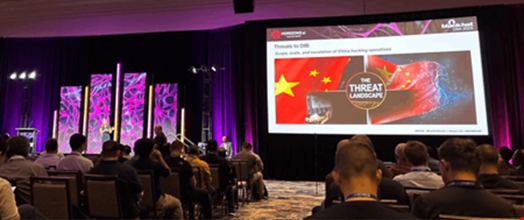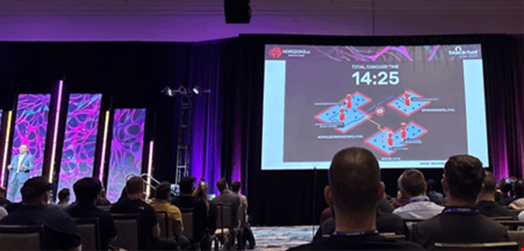Source: www.infosecurity-magazine.com – Author:
US defense contractors face heightened cyber threats despite many of them being “under-resourced, privately-owned companies”, warned Bailey Bickley, Chief of the US Defense Industrial Base (DIB) Defense at the NSA’s Cybersecurity Collaboration Center (CCC).
In a talk at Black Hat USA on August 6, Bickley shared the first results of the NSA’s Continuous Autonomous Penetration Testing (CAPT) program.
This initiative was launched in 2024 and provides free pentesting services, through Horizon3.ai’s NodeZero solution, to small contractors of the US Department of Defense (DoD).
Speaking to Infosecurity after the talk, Snehal Antani, CEO and co-founder of Horizon3.ai, revealed that the program is set to expand from 200 beneficiaries in 2024 to 1000 in 2025.
Additionally, Antani said Horizon3.ai and the NSA were exploring how to use AI agents to develop the program’s pretesting capabilities further in the future.
80% of US Defense Contractors Are Small Businesses
According to Antani, the US DIB includes approximately 300,000 companies, involving both prime and subcontractors to the DoD.
Bickley said that they are currently facing many cyber threats, on top of which are threats posed by Chinese nation-state cyber groups.

“China’s hacking resources outnumber those of the US and allies combined, and China has stolen more corporate data from the US than any other nation in the world. They know that they can target the supply chain to steal US intellectual property, research and development and military capabilities to then build their own militaries and economies from,” she said.
“We’re all familiar with China’s IP theft as well as new approaches, where actors like Volt Typhoon are now escalating into pre-positioning in US critical infrastructure to potentially conduct disruptive cyber operations at a time and place of their choosing,” she admitted.
“But there has been less discussion about their favorite initial access vectors, which remain simply exploiting Internet-facing publicly known unpatched vulnerabilities, so they don’t actually have to use costly and bespoke zero days when we make it easy on them,” she noted.
She also said that Chinese hackers are “getting really good at using AI to find and exploit unpatched instances of these vulnerabilities at scale.”
US defense contractors, on the other side, are “the backbone of our nation and yet many are privately owned companies that are frankly under-resourced and overwhelmed by all of the malicious cyber activity hitting their networks,” Bickley warned.
Today, she said, DIB companies are no longer only large defense contractors with countless resources to defend against this type of activity, but 80% are small businesses.
“These are companies that have outsourced IT, minimal IT staff and minimal awareness of security best practices,” she added.
Examples include AI companies whose models are being adopted for use in DoD applications, commercial transportation companies or foreign-owned utilities and telecommunications companies supporting US military bases overseas.
CAPT: 50,000 vulnerabilities identified for 200 DoD Contractors
To help these small defense contractors a member of the NSA’s CCC, which was already offering cyber services to DIB companies, contacted Antani after the Horizon3.ai founder gave a talk at Black Hat USA 2023 about autonomous pentesting and using AI for offensive cyber operations.
Together, Antani and Bickley’s team developed a pilot program in 2023 to offer pentesting services to small DIB companies. This initiative was fist named the Autonomous Penetration Testing program and later renamed it the Continuous Autonomous Penetration Testing (CAPT) program.
The program emerged from stealth in 2024 and benefited 200 defense contractors.
Bickley emphasized that the first year was very successful, with the CAPT program resulting in:
- 20,000 hours of pentesting
- 50,000 vulnerabilities identified
- 70% of these vulnerabilities mitigated
- Of those vulnerabilities, they mitigated more than 70% with a mean time to patch that was significantly faster than the industry standard.
In one example shared by Bickley, a research and development company with multiple contracts with various parts of the DoD that joined the CAPT program in January 2025 was able to “access a file share with over three million files, including very sensitive information related to nuclear-powered submarines and aircraft carriers – all of that in five minutes or running the NodeZero pentest.”
Fastest Full Domain Compromise: 77 seconds
During the session, Antani also shared some insights his team at Horizon3.ai gathered after conducting 20,000 hours of pentesting with NodeZero. These include:
- The fastest credential abuse detected in their tests took just five and a half minutes, giving defenders a very narrow window to respond
- Most credential compromises did not require advanced techniques like CVE exploitation, password spraying, or NTLM hash cracking
- 20% of the initial credentials compromised were domain admin accounts, granting attackers immediate, high-level access
- The fastest time to full domain compromise was 77 seconds
- The median time to domain compromise was 13 minutes, typically involving five to seven chained attack steps (e.g., misconfigured credentials, servers, and ineffective security tools)
- Entry-level user accounts were compromised in as little as 52 seconds
- Compromising an AWS user credential took 89 minutes, potentially suggesting that cloud-native environments are generally more secure due to fewer moving parts
According to Antani, today, AI-driven attacks are faster, more scalable and more thorough than traditional methods.
“The future of cyber warfare is algorithms abiding, algorithms with humans by exception,” he added.

Finally, Antani said Horizon3.ai has now integrated Model Context Protocol (MCP) servers, a backbone infrastructure for AI agents introduced by Anthropic in 2024, into NodeZero and plans to use it for future pentesting exercises as part of the PACT program.
“With MCP servers, you can now get into agentic workflows for actually fixing stuff even faster,” Antani concluded.
Original Post URL: https://www.infosecurity-magazine.com/news/dod-contractors-nsa-cyber-services/
Category & Tags: –
Views: 2



















































